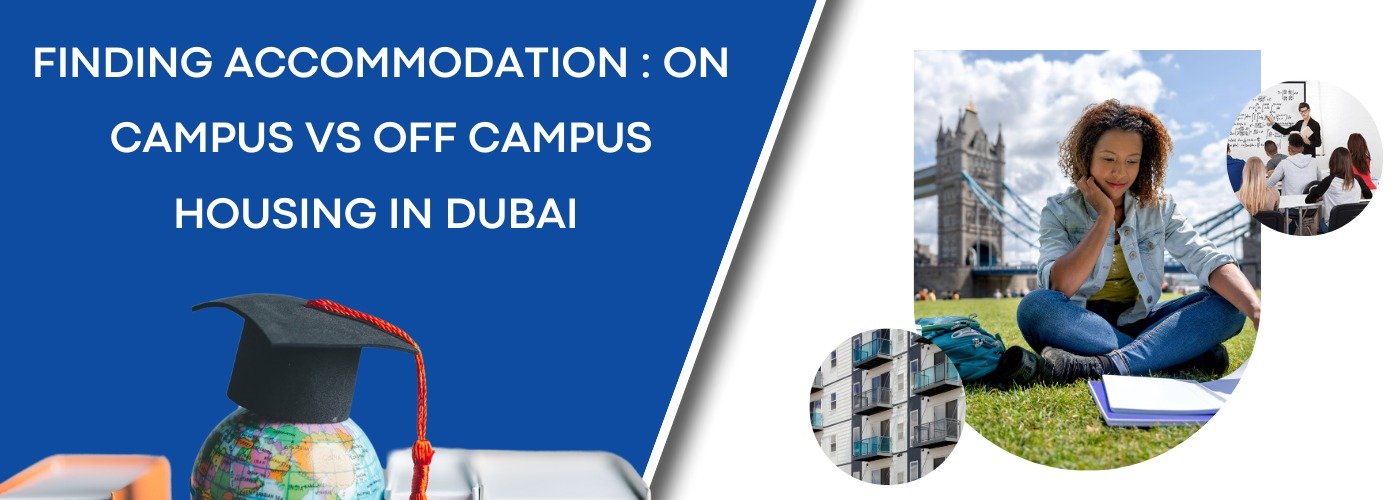
Finding accommodation: on campus vs off campus housing in Dubai
Securing the right accommodation is one of the biggest decisions international students face when planning to study in Dubai. Your choice of housing can significantly impact your university experience, lifestyle, and even academic success. Whether you prefer the convenience and community atmosphere of on-campus housing or the independence and flexibility of off-campus living, both options come with unique benefits and challenges.
When looking for housing in Dubai, students can check out options such as university residence halls and off-campus locations including apartments, houses that are privately rented, residence halls, etc. Prior to coming to Dubai, international students who wish to study there must obtain an overall estimate of their budget by learning specifics such as the cost of housing, the amenities offered, and the leasing procedures.
Types of student Accommodation in Dubai
Dubai offers a range of accommodation options for international students, catering to different budgets, lifestyles, and preferences. Here’s a breakdown of the main types of student accommodation in Dubai:
On-Campus Accommodation
On-campus accommodation is a popular choice for international students studying in Dubai. Many universities provide student housing directly on or near the campus, offering a convenient and secure living option. Below is an explanation of on-campus accommodation, including its benefits, costs, and what students can typically expect.
- Shared Dormitories/Rooms: Most universities offer shared rooms or dormitory-style accommodation where two or more students share a room. These accommodations often include shared common areas such as bathrooms, kitchens, and study spaces. Shared rooms range between AED 15,000 to AED 35,000 per year depending on the university and room type.
- Private Rooms: Some universities provide private single rooms for students seeking more privacy. These rooms are fully furnished with a bed, desk, wardrobe, and sometimes an en-suite bathroom. Private rooms typically range from AED 25,000 to AED 45,000 per year.
- Studio Apartments: Certain universities offer self-contained studio apartments for students, which include a small kitchen, bathroom, and living space in a single unit. These are usually reserved for senior students or those who prefer greater independence. Studio apartments range from AED 40,000 to AED 60,000 per year.
Facilities Provided in On-Campus Accommodation
- Furnished Rooms: On-campus accommodation typically comes fully furnished. Rooms are equipped with essentials like a bed, desk, chair, wardrobe, and sometimes additional furniture like bookshelves or nightstands. Higher-end accommodations may include additional amenities such as mini-fridges, microwaves, and TV units.
- Shared Common Areas: Shared common areas in on-campus housing include kitchens, lounges, and study rooms where students can cook, relax, and work together. These spaces promote social interaction and offer a comfortable environment for group activities or downtime.
- Wi-Fi and Internet Access: High-speed Wi-Fi is generally available throughout the residence buildings, allowing students to stay connected for their studies and personal needs.
- Recreational Facilities: Some university accommodations provide access to gyms, swimming pools, and sports facilities like basketball or tennis courts. Indoor recreational spaces such as game rooms with pool tables, table tennis, or gaming consoles are also common.
Benefits of On-Campus Accommodation
- Proximity to Campus Facilities: Living on campus means students are within walking distance of academic buildings, libraries, laboratories, and lecture halls. This saves time and money on transportation and allows for more flexible schedules.
- Safety and Security: With 24/7 security, CCTV cameras, and controlled access, on-campus accommodations provide a safer environment than many off-campus alternatives. Parents and students alike can feel confident in their safety while focusing on studies.
- Social and Cultural Integration: On-campus accommodation fosters a strong sense of community. It offers students the opportunity to meet peers from different cultural backgrounds, participate in university events, and form lasting friendships.
- Academic Focus: With study spaces, libraries, and access to academic support services nearby, on-campus housing can provide an environment conducive to focusing on studies. Some accommodations even offer quiet study rooms to ensure a distraction-free space for students.
Off-Campus Shared Apartments
Off-campus shared apartments are a preferred choice for students who value independence while wanting to reduce living costs by sharing space with roommates. These apartments are located in residential areas close to universities or well-connected via public transportation, offering both convenience and flexibility.
- 2-Bedroom Apartments: Two students typically share a 2-bedroom apartment, each with their own bedroom, while sharing common spaces such as the living room, kitchen, and bathroom. Rent per person ranges from AED 3,000 to AED 5,000 per month, depending on the apartment’s location and amenities.
- Studio Apartments (Shared): Some students choose to share a studio apartment, though this option provides less privacy as it’s a single room with a shared sleeping, living, and dining area. Rent ranges from AED 2,000 to AED 3,500 per person per month, depending on location and building facilities.
Benefits of Off-Campus Shared Apartments
- Lower Rent per Person: Sharing an apartment helps divide the rent, making it more affordable than renting alone or living in more expensive on-campus housing.
- Independence: Students enjoy more freedom in terms of living arrangements, schedules, and lifestyle choices without the restrictions imposed by university housing rules.
- Larger Living Space: Compared to on-campus dorms, shared apartments generally provide more space, including larger bedrooms, living rooms, and kitchens.
- Proximity to Local Amenities: Many off-campus apartments are close to supermarkets, malls, restaurants, and entertainment options, allowing students to explore more of Dubai.
Conclusion
Choosing between on-campus and off-campus accommodation in Dubai depends on a student’s preferences, budget, and lifestyle needs. While on-campus housing offers convenience, security, and a ready-made community, off-campus shared apartments provide greater independence, more space, and the opportunity to explore local life. Each option comes with its own set of costs and benefits, and students should carefully consider factors such as location, cost-sharing, commuting, and personal preferences when making their decision. Ultimately, both options provide comfortable living arrangements to support students in their academic journey in Dubai.
Frequently Asked Questions (FAQ)
Off-campus accommodation can be cheaper, especially if shared with roommates, as it allows you to split rent and utilities. However, additional costs like security deposits and commuting may add up.
Typically, utilities like electricity, water, internet, and air conditioning are not included in the rent and must be paid separately. The average utility cost per person is around AED 500 to AED 800 per month.
Yes, Dubai offers a variety of off-campus housing options. Websites, real estate agents, and university accommodation offices can help students find suitable places to live.
